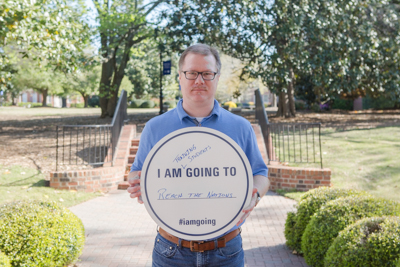Faculty Q&A with Scott Hildreth
January 19, 2017

 Scott Hildreth is the director of the Center for Great Commission Studies and an assistant professor of global studies at Southeastern Baptist Theological Seminary (SEBTS). He shares about his roles at Southeastern and how he is involved in equipping students to fulfill the Great Commission.
Scott Hildreth is the director of the Center for Great Commission Studies and an assistant professor of global studies at Southeastern Baptist Theological Seminary (SEBTS). He shares about his roles at Southeastern and how he is involved in equipping students to fulfill the Great Commission.
1. Tell us about yourself.
I’m originally from South Alabama. I was privileged to grow up in a Christian home with a brother and loving parents. I’ve been married to my wife, Leslie, for 24 years. We have two children, Rachel, who is 21 and a student at The College at Southeastern, and Jacob, who is 19 and a student at The University of Mobile. We served three terms in Central Asia and Europe with the International Mission Board.
2. How did you come to SEBTS?
While we were on the mission field, we were frequently asked to train new missionaries and teach them about missionary living and other related topics. We really enjoyed this, and thought that eventually we would want to do it stateside. We decided to move back to the U.S. so that I could pursue my Ph.D. at Southeastern. Shortly after coming to Wake Forest, I was asked to be the director of the Center for Great Commission Studies. I recently finished my Ph.D. and enjoy teaching and leading the Center.
3. When people ask you, “What do you do at Southeastern,” what is your response?
My title is “Director of the Center for Great Commission Studies.” Through this role I am involved in mission mobilization and training. In addition to my director role, I teach, specifically in the areas of missions and theology.
4. On what are you currently working?
Right now, I’m working on a couple of projects. I’m writing a book that looks at the Southern Baptist Convention’s Cooperative Program through the lens of God’s mission. In addition to that, I’m working on a project with Bruce Ashford, provost at Southeastern, and some other missions professors from other Southern Baptist seminaries.
5. What have you been reading recently?
Because I just finished my dissertation and a number of years of very focused reading, I’m trying to get caught up on my reading in the areas of missiology and contextualization. I just recently read Dr. Russell Moore’s Onward, which I appreciated because Dr. Moore challenges Christians to learn to live as a prophetic minority instead of a moral majority.
6. When you get home from work, what do you look forward to doing? (What are your other passions?)
I have a great family, so I really enjoy spending time with them. A lot of times, especially after we’ve been traveling a lot, we’ll just curl up on the couch with a bowl of popcorn and catch up on what we’ve missed on our DVR. I also really enjoy fly-fishing when I can get out.
7. Who are your role models?
The first person that comes to mind is my dad. He’s been married to my mom for 50 years. He’s not a professional Christian. He’s just a normal guy, and I look to him for stability and direction. He’s a good dad. I also think of Sid Sample, who was my pastor when I was growing up. He baptized me and also shepherded me through my calling to ministry.
8. Where are some of your former students?
I’m blessed because I’m able to say I have former students literally everywhere around the world. We have many students far away and in dangerous places. They serve in cities, suburbs and villages. They’re all over the place.
9. When a student completes your class, what do you want him or her to walk away with at the end of the semester?
I want them to see that the gospel is good news for all people at all times in all places. Our commission is to take that good news to them, and we need to take their context seriously. We communicate the gospel clearly in the contexts of those who we seek to reach.
10. We always say that every classroom at SEBTS is a Great Commission classroom. What does that look like for your class?
The Great Commission is about making disciples of all nations, sharing the gospel, and laboring with them while they grow in Christ. The Great Commission means you’re sharing the gospel, and I encourage my students to do that.